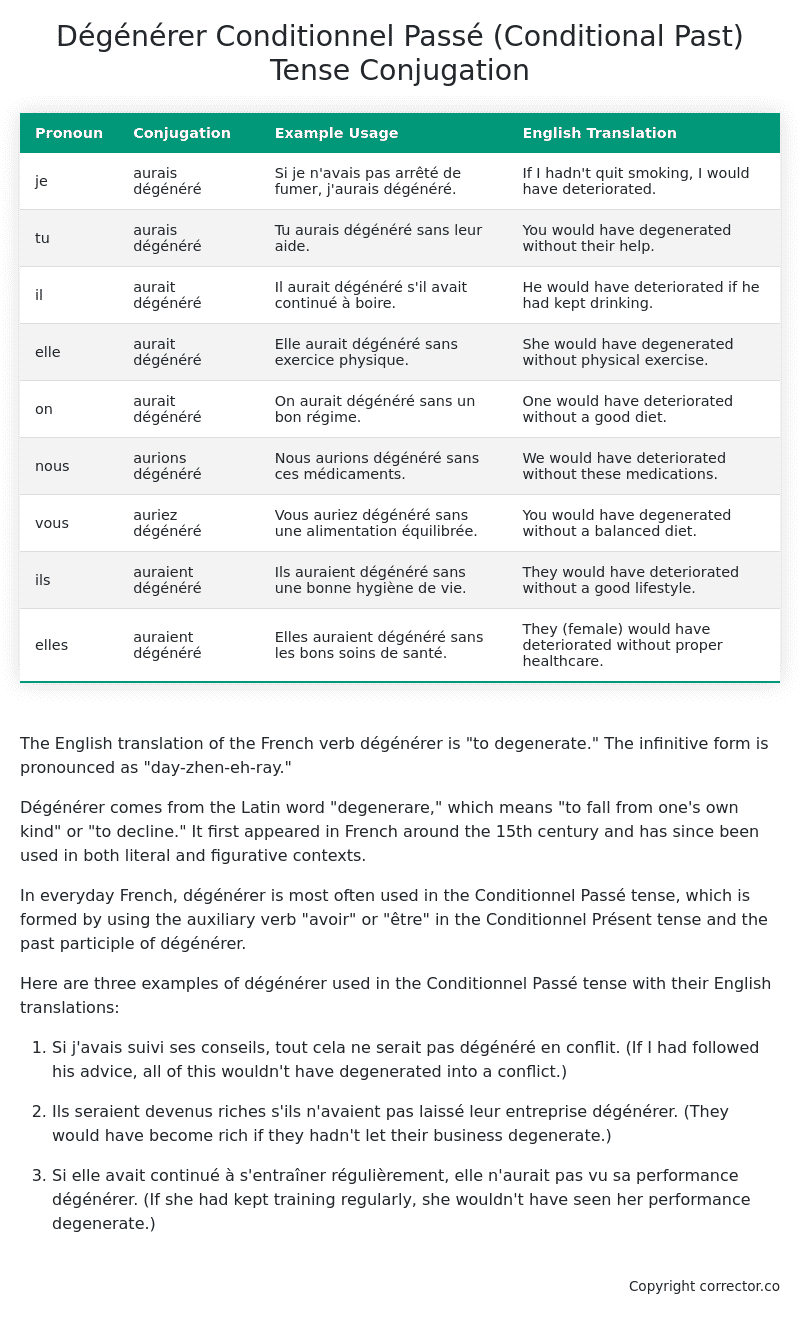Conditionnel Passé (Conditional Past) Tense Conjugation of the French Verb dégénérer
Introduction to the verb dégénérer
The English translation of the French verb dégénérer is “to degenerate.” The infinitive form is pronounced as “day-zhen-eh-ray.”
Dégénérer comes from the Latin word “degenerare,” which means “to fall from one’s own kind” or “to decline.” It first appeared in French around the 15th century and has since been used in both literal and figurative contexts.
In everyday French, dégénérer is most often used in the Conditionnel Passé tense, which is formed by using the auxiliary verb “avoir” or “être” in the Conditionnel Présent tense and the past participle of dégénérer.
Here are three examples of dégénérer used in the Conditionnel Passé tense with their English translations:
-
Si j’avais suivi ses conseils, tout cela ne serait pas dégénéré en conflit. (If I had followed his advice, all of this wouldn’t have degenerated into a conflict.)
-
Ils seraient devenus riches s’ils n’avaient pas laissé leur entreprise dégénérer. (They would have become rich if they hadn’t let their business degenerate.)
-
Si elle avait continué à s’entraîner régulièrement, elle n’aurait pas vu sa performance dégénérer. (If she had kept training regularly, she wouldn’t have seen her performance degenerate.)
Table of the Conditionnel Passé (Conditional Past) Tense Conjugation of dégénérer
| Pronoun | Conjugation | Example Usage | English Translation |
|---|---|---|---|
| je | aurais dégénéré | Si je n’avais pas arrêté de fumer, j’aurais dégénéré. | If I hadn’t quit smoking, I would have deteriorated. |
| tu | aurais dégénéré | Tu aurais dégénéré sans leur aide. | You would have degenerated without their help. |
| il | aurait dégénéré | Il aurait dégénéré s’il avait continué à boire. | He would have deteriorated if he had kept drinking. |
| elle | aurait dégénéré | Elle aurait dégénéré sans exercice physique. | She would have degenerated without physical exercise. |
| on | aurait dégénéré | On aurait dégénéré sans un bon régime. | One would have deteriorated without a good diet. |
| nous | aurions dégénéré | Nous aurions dégénéré sans ces médicaments. | We would have deteriorated without these medications. |
| vous | auriez dégénéré | Vous auriez dégénéré sans une alimentation équilibrée. | You would have degenerated without a balanced diet. |
| ils | auraient dégénéré | Ils auraient dégénéré sans une bonne hygiène de vie. | They would have deteriorated without a good lifestyle. |
| elles | auraient dégénéré | Elles auraient dégénéré sans les bons soins de santé. | They (female) would have deteriorated without proper healthcare. |
Other Conjugations for Dégénérer.
Le Present (Present Tense) Conjugation of the French Verb dégénérer
Imparfait (Imperfect) Tense Conjugation of the French Verb dégénérer
Passé Simple (Simple Past) Tense Conjugation of the French Verb dégénérer
Passé Composé (Present Perfect) Tense Conjugation of the French Verb dégénérer
Futur Simple (Simple Future) Tense Conjugation of the French Verb dégénérer
Futur Proche (Near Future) Tense Conjugation of the French Verb dégénérer
Plus-que-parfait (Pluperfect) Tense Conjugation of the French Verb dégénérer
Passé Antérieur (Past Anterior) Tense Conjugation of the French Verb dégénérer
Futur Antérieur (Future Anterior) Tense Conjugation of the French Verb dégénérer
Subjonctif Présent (Subjunctive Present) Tense Conjugation of the French Verb dégénérer
Subjonctif Passé (Subjunctive Past) Tense Conjugation of the French Verb dégénérer
Subjonctif Imparfait (Subjunctive Imperfect) Tense Conjugation of the French Verb dégénérer
Subjonctif Plus-que-parfait (Subjunctive Pluperfect) Tense Conjugation of the French Verb dégénérer
Conditionnel Présent (Conditional Present) Tense Conjugation of the French Verb dégénérer
Conditionnel Passé (Conditional Past) Tense Conjugation of the French Verb dégénérer (this article)
L’impératif Présent (Imperative Present) Tense Conjugation of the French Verb dégénérer
L’infinitif Présent (Infinitive Present) Tense Conjugation of the French Verb dégénérer
Struggling with French verbs or the language in general? Why not use our free French Grammar Checker – no registration required!
Get a FREE Download Study Sheet of this Conjugation 🔥
Simply right click the image below, click “save image” and get your free reference for the dégénérer Conditionnel Passé tense conjugation!

Dégénérer – About the French Conditionnel Passé (Conditional Past) Tense
Formation
Common Everyday Usage Patterns
Expressing Unreal Past Scenarios
Polite Requests or Suggestions
Expressing Doubt or Uncertainty
Interactions with Other Tenses
Conditional Present
Indicative Past Tenses
Conditional Future
Summary
Want More?
I hope you enjoyed this article on the verb dégénérer. Still in a learning mood? Check out another TOTALLY random French verb conjugation!


